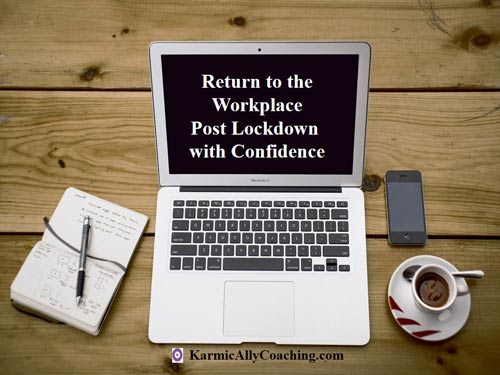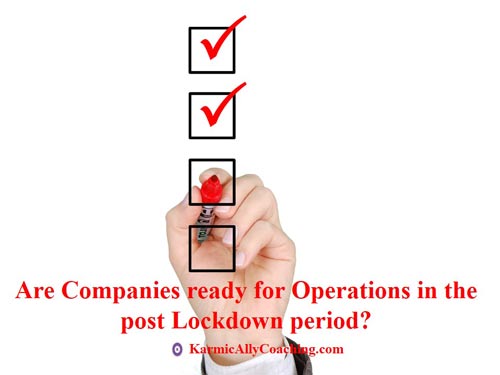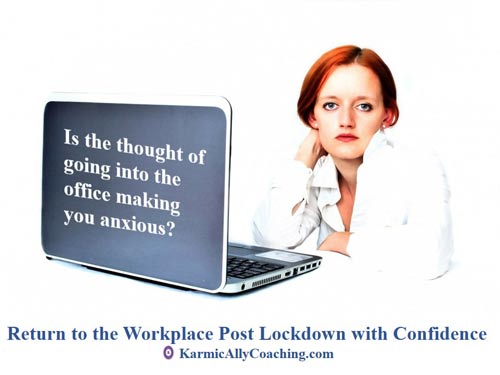This post has already been read 1523 times!

I knew it was a question the corporate world and employees would have to face at some point of time.
Going into a lockdown to save lives and contain the spread of COVID-19 was important. It was equally important to reopen the business world if economies were to survive. We needed to prevent the kind of global meltdown we experienced in 2008.
While essential services like banking, telecom, energy, medical and essential food supplies required a minimum number of employees to report to the workplace, many experienced the work from home scenario for the first time.
I know this firsthand because my contact person for my internet and mobile services was fielding complaints and providing solutions from home.
I salute the COVID Warriors who stepped up to the plate and showed up each day to make the lives of the rest of us easier.
From the questions I was being asked on Quora and other forums, I was also aware of the loss of jobs and threat of job loss if people didn’t come into work.
Many were not aware of the advisories issued by the government or their legal rights because redundancies are relatively uncommon in India.
It’s still considered by many to be a blue-collar labor problem for which trade unions exist to protect the worker rights. Not many knew that it could happen to a white collar professional.
There were tacit hints of fear about the future of their jobs and what would happen.
How prepared were businesses to operate in the new scenario?
Governments around the world are not insensitive to the needs of the economy. Stimulus packages have been created to meet the need of jumpstarting the economy in the days after lockdowns were lifted or eased even as cases continue to be reported.

But was the corporate world ready with the right infrastructure to enable remote working?
Were they prepared for the time when workers would return to the workplace or factory?
The Economic Times surveyed both India headquartered companies as well as multinationals not headquartered in India, covering sectors including auto, banking and financial services, consulting, engineering design, education, FMCG, healthcare, technology, IT-enabled services, manufacturing, pharma among others between April 21 to April 23.
The survey revealed that more than 60% of companies were in advanced stages of planning for business operations post the ending of lockdown 2.0 on May 3rd and the commencement of Lockdown 3.0 when certain relaxations were allowed.
Of the companies surveyed more than 40% were proactively looking at containment measures to insulate their business. Roughly 12 per cent were still trying to figure out how to operate in the post-lockdown environment.
In the meantime, India Inc learned to work from home with remote teams, remote engagement and the necessary safeguards at the workplace to protect employees and customers.
While not all companies were at the same page in terms of their preparations, they all understood the need for agility. A new set of guidelines for both corporations and individuals started to emerge.
But being technologically prepared is just one part of the problem, companies have to be psychologically prepared too.
Organizations need to be alert and empathetic to the needs of employees working from home.
(Source: Coronavirus: Health scare forces work from home, but is India Inc ready?)
Then there is the issue of requiring employees to return to the workplace and dealing with their fear of risking infection.
The IBM Study: COVID-19 Is Significantly Altering U.S. Consumer Behavior and Plans Post-Crisis, polled more than 25,000 U.S. adults in the month of April to understand how COVID-19 has affected their perspectives on a number of issues. This included retail spending, transportation, future attendance at events in large venues, and returning to work.
The results revealed Americans didn’t want to go back to the office.
In particular:
- 54% want remote work to be their primary way of working
- Over 75% said they would like to continue to work remotely at least occasionally
- Almost 40% indicated they feel strongly that their employer should provide employee opt-in remote work options when returning to normal operations
It isn’t just India or the USA, my international clients tell me about how their organizations are dealing with the situation. They are giving options to employees to come into the workplace or wait till the second wave of return to the office while continuing to work from home.
The fear and anxiety are universal. I’ve seen the sentiments of the IBM survey voiced by professionals in other parts of the world too.
How to deal with returning to the workplace anxiety
Besides the normal day to day hustle and immense stress of daily living in the modern world, we now have a pandemic to contend with. We have to deliver in our jobs in the perpetual shadow of a possible COVID-19 infection.

Unfortunately, dealing with anxiety has become somewhat of a normal part of life for many individuals in the world today.
Although this problem is not necessarily a new phenomenon, there are certain aspects of our current situation that have served to exacerbate the issue.
Furthermore, we are expected to juggle more responsibilities at one time, all while being as productive as possible.
Although anxiety certain varies in intensity and frequency from person to person, there are a few ways to deal with the problem that are beneficial for anyone experiencing this issue.
Let’s look at a few techniques in order to alleviate some of your anxiety and prove you’re a good responsible professional.
Control What You Can Control
The truth is, many of the issues causing anxiety in your life right now are beyond your control.
This includes global and community issues as well as problems in your personal life.
What you need to realize is that the weight of the world is NOT on your shoulders, even though it can certainly seem like it at times.
Anxiety tells you that you should be worried about solving problems that are way out of your hands.
In reality, focusing on the issues that you actually have the ability to resolve is a much healthier response to a problem-filled world.
Coming back to the workplace and fear of returning to work, remember that the employer has the obligation to provide a safe place to work. They need to follow reasonable safety standards for their industry as well as government mandates and advisories that are in effect at this time.
The cost to company for employing you isn’t just the salary you earn; they also have responsibilities for you during the working hours.
Companies would thus set parameters and hours for employees, whether they come into the workplace or choose to work from home because without those parameters, they might become liable for overtime.
More importantly they need this for employee insurance purposes where the insurer needs to know about the employees who are working from home in case of an accident and whether the employee is covered.
So, trust they will do the right thing by their employees and set up the right protocols to protect everyone.
It’s Okay to Not Feel Okay
Another side effect of anxiety is a feeling of isolation. People experiencing anxiety on a routine basis tend to feel like they are the only ones dealing with this issue.
Because of this perspective, we often feel like everyone else is much happier than we are, like we won’t be accepted if anyone else knew the extent of our anxiety. It is so important to realize that this is far from the truth.
Everyone around you is experiencing some degree of anxiety or mental hang up. You are far from alone. Don’t feel like you have to go through life acting as if everything is okay when it isn’t.
When it comes to going back to work, it is natural for you to not feel completely comfortable with the situation.
There could be a number of reasons for that.
One important reason would be if you’re not feeling safe returning to work because you’re a high-risk employee (i.e. you have a higher risk of contracting COVID-19 or your age is 65 or over).
In such a situation, if HR is not already aware of your situation, you need to communicate it to your employer in writing and let them work around the challenge rather than put yourself at risk and get stressed out about it.
Even if you’re not in a high-risk category and your employer has taken adequate precautions to protect you, it is normal to have concerns.
Talk to your boss or to HR about it and communicate your anxiety and concern and request if you could be brought back in the second wave of reopening especially if there are other employees who could be brought back first.
Good companies don’t like to lose valuable employees. You might even be able to negotiate using any accrued leave to compensate for the delayed return if your job responsibilities cannot be performed from home.

Reach out for Help If You Need It
Finally, if your anxiety is something you are having trouble dealing with on your own, then ask for help.
There is absolutely nothing wrong with seeking professional help for this issue. Ironically, our society welcomes getting help for even minor physical ailments. Yet they act as if doing the same for a serious mental issue is taboo.
Consider this, if you had a toothache, you would most certainly seek a dentist to take care of it.
Why would you not seek a doctor that is medically trained in alleviating mental health issues if you are dealing with anxiety?
There is help out there, get it if you need it!
Finally, learn to take things one day at a time and practicing stress management techniques to lesson anxiety and build resilience.
Live in the moment. This means focusing all of your physical and mental energy on what is going on right now. Not only does this simplify life, it also allows you to get the most out of your limited time.
That’s how I’ve been dealing with the Lockdown and it has made things less stressful than they needed to be.
If you want to understand how your mind is processing the situation and find your own unique solution, remember to download the worksheet How to Overcome Trying Situations By Changing Your Mind here or by clicking the below image.




 I adhere to the Certified Coaches Alliance Code of Ethics and Standards. A copy is available on request.
I adhere to the Certified Coaches Alliance Code of Ethics and Standards. A copy is available on request.
 Let's Talk through the Connect Form:
Let's Talk through the Connect Form:
I have been working from home for the past 30 years so for us it wasn’t too different and we were not in total lockdown especially as we had to move in the middle of this
Great info for people though who did have this experience Thank you
You have been lucky about not having a total lockdown Suzie, especially if you were moving at such a difficult time. We’re hoping to have an easier time in the next phase of the lockdown and I am keen to see what the workplace culture will look like then.
Vatsala,
Thanks for your wisdom!
As a mental health professional, I agree there are many people affected by the lockdown and also the re-opening. People are experiencing anxiety, depression and post traumatic stress. I hope as you do, organizations are empathic to this fact and offer resources to their employees to be well.
Many Blessings to you and your family,
Lisa
Thanks Lisa. Empathy is required more now than ever.
Your good wishes are heartily reciprocated. Take care of yourself and your loved ones.
Thank You for sharing all this insight with us Vatsala. It’s important companies begin thinking about how to pivot their work place culture. Many are yet to realise that life will.not and should not do back to normal. No we need to make it better and if adapting working from home is part of it then it should be considered. Beside the fear of being infected and all, this has been an eye opener for many. You can still deliver without burning the midnight candle at the office.
Thank you for sharing your insights with us, Leila. Working from home for short periods or a day here and there has been common for a long time and I used to do it in my corporate world days when I wanted to work without being disturbed. But it wasn’t part of the then ‘normal’. I foresee changes in the workplace once companies work out how to do it.
Hi Vatsala, Thank you – I found this all very interesting and had wondered about some of the facts you included. My sweetheart has been home since this started and boy would I love him to be able to stay working from home. 🙂 I have many friends who now that they have experienced working from home are really hesitant to go back especially considering the risk of the second wave. Then I have a few friends that CANNOT wait to be back OUT OF THE HOUSE – no longer home schooling and getting out of the home regularly. I love that most companies have gotten very creative and hope everyone considers the safety of the masses first. Sending much love and am hoping you and your loved ones are all safe.
Thanks for the good wishes Jenny. There are people on both sides who want to go back and others who prefer working from home or not being the first to go back to the office. It comes down to how confident they are feeling and also if there are other non-work related concerns that can get aggravated if they contract the virus despite all the measures taken, such as elderly parents or young children. I can only hope companies continue to demonstrate empathy and consideration to valuable employees while maintaining a running business.
Timely post that I can share with many of my clients who are now making the transition from home to the workplace. Many are struggling with leaving their comfy cozy home spaces, families, and pets so this information is so needed Vatsala Much love xo
Thanks for sharing it forward, Debra. The concerns are valid and the anxiety is real. The more we can help professionals find their sweet spot and return to the workplace without fear, the better it is for all of us.